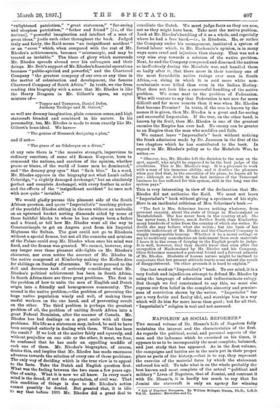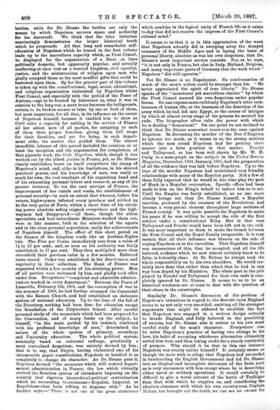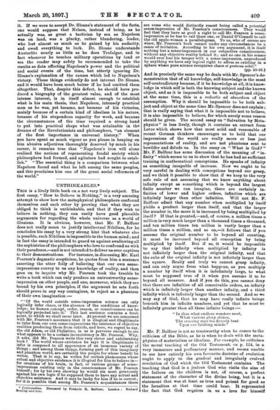NAPOLEON AS SOCIAL REFORMER.•
THE second volume of Dr. Sloane's Life of Napoleon fully maintains the interest and the characteristics of the first. As regards the political, social, and personal aspects of the man and the influence which he exercised on his times, it appears tons to be incomparably the most complete, balanced, and just study that has appeared. As in the first volumes the campaigns and battles are in the main put in their proper place as parts of the history,—that is to say, they represent the exercise of the material force by which the statesman enforced his will. To take what is on the whole probably the• best known and most complete of the actual "political and military " Lives of Napoleon, that of Jomini, and contrast it with Dr. Sloane's, it is hardly too much to say that for Jomini the statecraft is only an agency for winning • Life of Napoleon Bonaparte. By William Millegan Sloane, Ph.D., L.H.D. Vol. LL London: Macmillan and 0o.
battles, while for Dr. Sloane the battles are only the means by which Napoleon secures space and authority
for his statecraft. We think that the later historian convincingly demonstrates the larger historical truth which he propounds. All that long and remarkable self- education of Napoleon which he traced in the first volume leads up to the marvellous capacity which, as First Consul, he displayed for the organisation of a State on lines politically despotic, but apparently popular, and actually conferring at once rest on a wearied kingdom, civil equality, justice, and the ministrations of religion upon men who gladly accepted these as the most needful gifts that could be bestowed upon them. By far the greater part of this volume is taken up with the constitutional, legal, social, educational, and religious organisation elaborated by Napoleon whilst First Consul, and especially with the period of the Peace of Amiens,—apt to be treated by historians as, what it was in relation to the long war, a mere truce between the belligerents, certain to be broken sooner or later by one or both of them, but most important, for all that, in its influence on the career of Napoleon himself, because it enabled him to show as Civil ruler a capacity for uniting in the service of France all her ablest men of all parties, for assigning to each of them their proper function, giving them full scope for their faculties, and yet for being, in each depart- ment alike, the master who guided them. The almost incredible labours of this period included the creation, or at least the inception and the organisation for completion, of that gigantic work, the Code Napoleon, which, though it was worked out by the ablest jurists in France, yet, as Dr. Sloane clearly establishes, bears on itself everywhere the stamp of Napoleon's mind, and, alike in his limitations, in his shrewd practical genius, and his knowledge of men, was really as much his own, the real resultant of his organising hand and of his exhausting personal labour and research, as any of his greater victories. So too the vast surveys of France, the improvement of her canals and roads, the establishment of personal security—to such an extent that whereas, before his return, highwaymen infested every province and robbed up to the very gates of Paris, within a short time of his attain- ing power absolute safety reigned everywhere and the high- waymen had disappeared — all these, though the ablest specialists and best subordinate Ministers worked them out, were in like manner, both in the selection of the agents and in the close personal supervision, really the achievements of Napoleon himself. The effect of this short period on the finance of the kingdom reads like an Arabian-Nights tale. The Five per Cents. immediately rose from a value of 1 to 12 per cent., and, as soon as his authority was fairly established, to 17 per cent. They thus multiplied more than elevenfold their previous value in a few months. Enforced loans ceased. Order was established in the direct taxes, and regularity in their collection. The Bank of France was organised within a few months of his attaining power. Men of all parties were welcomed by him, and gladly took office under him. Everywhere " competent and admirable adminis- trators worked in every department." Between the Peace of Luneville, February 9th, 1801, and the resumption of war in the summer of 1803, he had further arranged the Concordat with the Roman Church, and bad established an elaborate system of national education. Up to the time of the fall of the Directory, nothing had been done for education except the foundation of the Polytechnic School. After careful personal study of the memorials which had been prepared for the Convention, and of many books on the subject, he himself, "in the main guided by his instinct, combined with his profound knowledge of men," determined the nature of the whole system of primary, secondary,
and University education. The whole political system, nominally based on universal suffrage, practically a most centralised despotism, was entirely devised by him ; that is to say, that Sieyes, having elaborated one of his innumerable paper constitutions, Napoleon so handled it as completely to change its character. As Dr. Sloane pats it, Napoleon devised "the measures which still control depart- mental administration in France, the law which virtually revived the Bourbon system of intendants imposing on the country that rigorous hierarchical-political centralisation which no succeeding Government—Royalist, Imperial, or Republican—has been willing to dispense with." As he further says,—" There is not one of the great structures which combine in the logical unity of French life as it exists to-day that did not receive the impress of the First Consul's colossal mind."
It seems to us that it is in this appreciation of the work that Napoleon actually did in sweeping away the decayed remnants of the Middle Ages and in laying the basis of personal liberty, absolute as was his own despotism, that Dr. Sloane's most important service consists. For, as he says, "it is not only in France, but also in Italy, Holland, Belgium, and many important parts of Germany that the work which Napoleon " did still operates."
Yet Dr. Sloane is no Napoleonist. No condemnation of much of the man's action could be stronger than his. " He never appreciated the spirit of true liberty." Dr. Sloane speaks of the "monstrous yet marvellous charter" by which the First Consul secured his own despotism under popular forms. No one exposes more ruthlessly Napoleon's utter reck- lessness of human life, or the baseness of the desertion of the army which he had led into Egypt, or the course of intrigue by which at almost every stage of the process he secured his ends. The biographer often calls the power with which he is dealing " demoniacal." On one point we are inclined to think that Dr. Sloane somewhat overstates the case against Napoleon. In discussing the murder of the Due d'Enghien he ignores too much, as it seems to us, the strong motives which the men round Napoleon had for putting their master into a false position in that matter. Fouche and Talleyrand, as has been well shown by Mr. W. H. Craig in a monograph on the subject in the United Service 2efagazine, December, 1894, January, 1895, had the preparation of all the evidence that was laid before Napoleon. Up to the time of the murder Napoleon had maintained very friendly relationships with many of the Royalist party. Not a few of them fully expected that he would in due time play the part of Monk in a Royalist restoration. Specific offers had been made to him on the King's behalf to induce him so to act. Until the Empire was fairly established, as no one more clearly brings out than Dr. Sloane himself, a Royalist reaction, produced by the excesses of the Revolution, had become a very potent element throughout large sections of French society. It was quite possible for Napoleon to make his peace if he was willing to accept the role of the first subject under a constitutional King. But in that case Talleyrand and Fouche would have been left out in the cold. It was most important to them to make the breach between the First Consul and the Royal Family irreparable. It is very certain that all their influence was thrown on the side of urging Napoleon on to the execution. That Napoleon himself was unconscious of this, that he accepted, and all his life believed, evidence which we now almost certainly know to be false, is tolerably clear. At St. Helena he always took the whole responsibility on to his own shoulders. He would cer- tainly have done that rather than admit that he had in any way been duped by his Ministers. The whole part in the plot played by Fouche and Talleyrand for their own ends is com- pletely ignored by Dr. Sloane. It seems to us to be an historical weakness not at least to deal with the question of their share in the catastrophe.
Similarly Dr. Sloane's discussion of the problem of Napoleon's intentions in regard to the descent upon England seems to us not only very one-sided, omitting all the strongest arguments that might be adduced to establish the fact that Napoleon was engaged in a serious design actually to invade England, and fully believed in the possibility of success, but Dr. Sloane also is untrue to his own most careful study of the man's character. Everywhere else he notes Napoleon's practice of having two strings to his bow, his habit of accepting whichever alternative ultimately suited him best, and then taking credit for a steady continuity of purpose. Why should it be that in this one instance Napoleon was utterly unlike himself P It certainly seems as though the mere wish to allege that Napoleon had succeeded in bamboozling the English Government had led Dr. Sloane into an illogical and incomplete statement of the facts such as is very uncommon with him except where he is describing either naval or military operations. It would certainly be difficult to give a worse account of the battle of Trafalgar than that with which he supplies us, and considering the absolute clearness with which his own countryman, Captain Mahan, has brought out the truth, we can see no excuse for it. If we were to accept Dr. Sloane's statement of the facts, one would suppose that Nelson, instead of being, as he actually was, as great a tactician by sea as Napoleon was on land, was a plucky, rather blundering, leader, who lost almost as much as he gained by his audacity, and owed everything to luck. Dr. Sloane understands Austerlitz nearly as little as he does Trafalgar, and in fact whenever he touches military operations by land or sea the reader may safely be recommended to take the results as data affecting Napoleon's power and the political and social events of the time, but utterly ignoring Dr. Sloane's explanation of the causes which led to Napoleon's victory. These things evidently do not interest Dr. Sloane, and it would have been much better if he had omitted them altogether. That, despite this defect, he should have pro- duced a biography of the greatest value, and of the most intense interest, is in itself almost enough to establish what is his main thesis, that Napoleon, intensely practical man as he was, yet became, not because of his victories, mainly because of a certain kind of idealism in his nature, because of his stupendous capacity for work, and because the circumstances of the time required a strong hand to put into practical shape what was attainable in the dreams of the Revolutionists and philosophers, "an element of the first importance in universal history." When you have spent as much vigour as you please in heaping on him abusive adjectives thoroughly deserved by much in his career, it remains true that "Napoleon's iron will alone realised the notions of regenerating feudal society which philosophers had formed, and agitators had sought to estab- lish." " The essential thing is a comparison between what Napoleon found and what he left among the same peoples, and this proclaims him one of the great social reformers of the world."








































 Previous page
Previous page